This is part 2 of my series on starting a cidery.
Listen to carrion – put your ear
close, and hear the faint chattering
of the songs that are to come.— Wendell Berry, Manifesto: The Mad Farmer Liberation Front
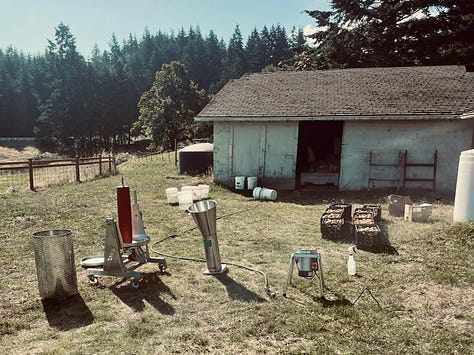
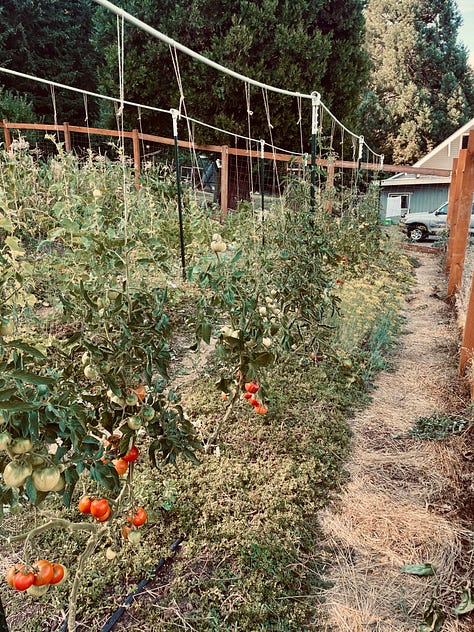
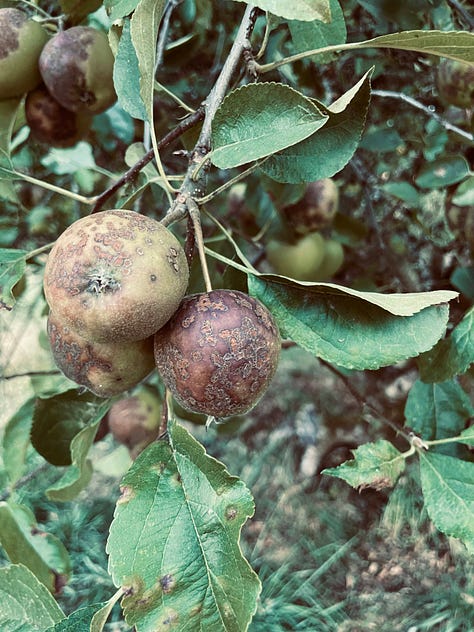
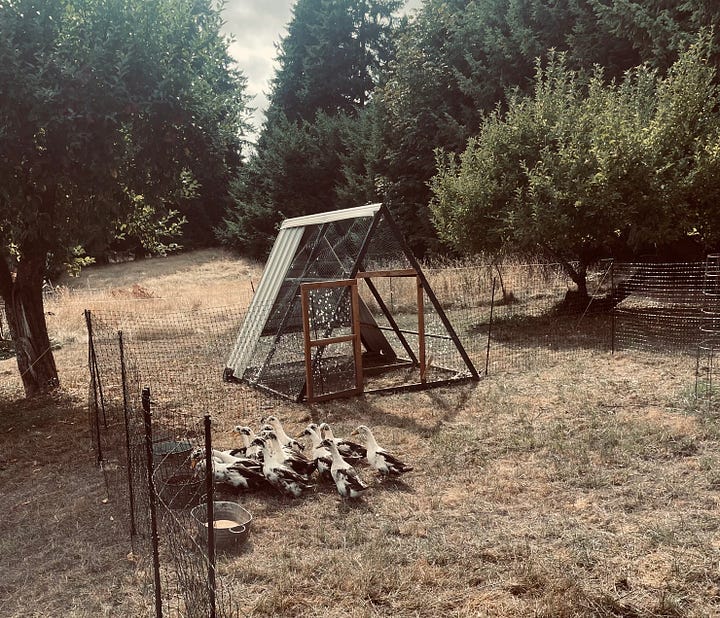
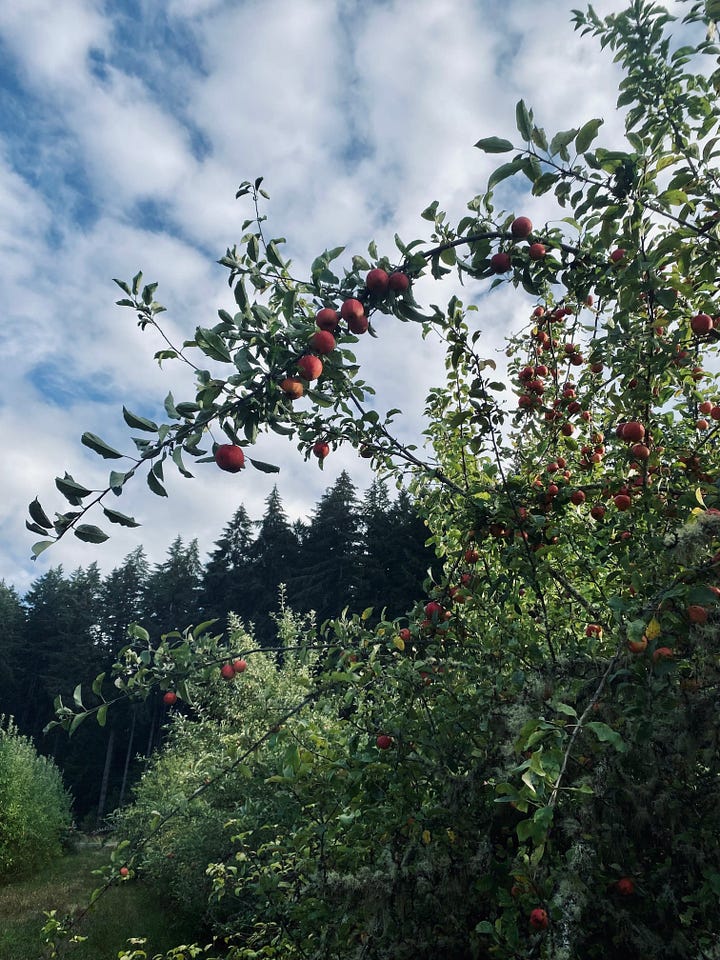
I.
The yellow jackets are drunk again. They cling to the steel belly of the press and sway in the late September heat as they gorge on rivulets of juice that bleed through the pores. A few stagger in circles at the bottom of a used bucket slick with syrup, wings gummed shut. Others lie catatonic, half-drowned. There’s no alcohol in it yet, but the sugar does something to them — unspools their instincts, leaves them dazed and docile. I don’t worry about getting stung anymore.
The fields have turned golden, the hills too steep to mow bristle with queen anne’s lace gone to seed. The spring is dry. I heave another crate of apples from the back of my battered tundra and stack it on three empties for leverage. It’s a familiar rhythm: toss apples into the grinder, slow and steady. Rush and the blades choke on pulp, and I have to unscrew all four wingnuts and claw out the muck.
This year we upgraded to an electric grinder and an eighty-liter stainless steel bladder press. They lack the creaky music of the homemade white oak screw press of years past, the physicality of cranking for hours at a time. But we had a baby in May and Bernadette said I had to speed up the process.
The press full, I flip the ball valve on the irrigation line and juice spills out. Eloise wanders over from the garden gripping a yellow Hungarian sweet pepper in one hand and a cucumber in the other. Bernadette follows behind with a basket of sungolds and Sam strapped to her chest. Our mottled black and white Ancona ducks peer side-eyed over the fence.
Can I have more cider? It’s more a declaration than a question, and Eloise has already had five cups already, but I can’t resist. I take her glass and fill it and we tell her Last one or you’ll get the apple skitters. She gets the apple skitters anyway.
II.
Months later and the two barrels stamped Domaine Drouhin lay silent in the barn save an occasional belch, the last slow breaths of the yeasts working. Carboys sprawl across pallets on the floor like drunk uncles after Thanksgiving. This is the cidery. Not much yet, but even at this scale there’s too much to drink, barter, or gift. Which I guess is how you know it’s time to go official — let the feral cat out of the bag and see if it survives in the wild.
We’re halfway there. Landrace Cider & Wine exists on paper now, incorporated in the State of Oregon. We have a federal permit to produce alcohol in hand. We’ve shoved the last of the state and county paperwork into the void, and now we wait. If the gods of bureaucracy smile down we’ll be peddling firewater with the government’s stamp of approval by fall.
I guess that’ll make us a real cidery, although I doubt it will feel like it. Running a business is worlds apart from crushing apples. Bernadette has been reading The Idiot’s Guide to Starting and Running a Winery. It can’t be that hard, right?
We’ll have to post Instagram reels of bottling day and rattle off tasting notes (blackcurrants with some granny purse on the finish1). I’ll rope my undergrad cousin into designing our labels between beer pong tournaments and spikeball injuries (his credentials — multiple commissions to paint manatees and turtles across the walls of elderly ladies’ swimming pools). We’ll probably need to graduate from TurboTax to whatever unholy spreadsheet-tax-software-hybrid small businesses use. QuickBooks? Google Sheets? Rawdog it with receipts stuffed in a mason jar? Beyond avoiding bankruptcy, I’m not exactly sure what success looks like.
III.
But when I close my eyes, I see it: a timber-framed hobbit-hole of a tasting room wedged into the hillside where lavender and rosemary grows leggy and unchecked, the roof a riot of grass and yarrow and creeping thyme. On a sodden February evening a fire roars in the woodstove, warming the old mossbacks who bicker over a chessboard as kids dart under thick white oak tables. It smells like earth and smoke and wet wool.
There’s no kitchen, just a cracked cob oven and jars of kraut and pickles from the crocks buried outside. Hard cheese, rinds washed in our cider, sits on the counter. Most of the customers live nearby. They return their empty bottles when they come, bring garden surplus and duck eggs to sell at our farmstand. Cows graze between the rows of apples studded with chestnuts and hazels. It’s cash only.
I’m a little embarrassed at this picture. It veers uncomfortably close to cliche. But pastoral fantasy or not, I am beguiled by an American version of the convivial peasant ideal, that near-extinct species of Jeffersonian yeoman farmer with soil-stained hands quaffing cider and wassailing in the orchard, living an independence that means knowing the histories of his apples and his neighbors.
Yes, life used to be hard — backbreaking labor, winters that could kill you, neighbors who could save or ruin you. But I can’t help but wonder: Did we have to stop the barn-raisings? Was it worth trading community for convenience? Is a healthy local economy really an anachronism?
IV.
So, why bother? It’s a shit ton of work for a barn full of hooch I don’t know what to do with yet.
I feel like a mess of contradictions, trying to live well in an age where technology’s grip tightens like a ratchet every year and local culture dissolves into global soup. These tensions aren’t unique to me — they’re woven into the fabric of modern life, a collective schizophrenia where we yearn for authenticity while depending on an industrial system. Modernity’s great parlor trick is making us complicit in our own undoing, and awareness of it breeds quite a bit of cognitive dissonance.
Despite luddite sympathies, I still spend half my waking hours before a bloodless blue monitor writing code. I’ve turned it over in my mind for years, but escape feels unlikely — at least until AI takes my job, the grid fails, or I stumble into a more creative way to own a piece of land.
Being a parent is a joy, and it was never easy, but I can’t shake the feeling that it shouldn’t be as hard as we’ve collectively made it. It feels… more fraught. I’m not sure exactly what I mean by that. I still haven’t quite found God.
These are my knots to untangle. This essay series will be an attempt to poke at some of them, and at the heart of it lies my fascination with the archaic human craft of fermentation and my love for the raw materials that fuel it. The cidery is a north star to the life I want to be living, our two barrels in the barn a small rebellion against the sterility and ugliness of modern culture.
But if that sounds melodramatic or grandiose let’s just call it an excuse to share a homemade drink outside when the sun is peachy fat and gardens are ripping along, or inside as the woodstove churns against the damp and it’s time for dreaming. The yellow jackets understand, those striped vultures feasting on apple carrion in sacramental gluttony. In their drunken revels I hear the faint chattering of songs to come.
From the Somm documentary — there’s some golden one liners in there.



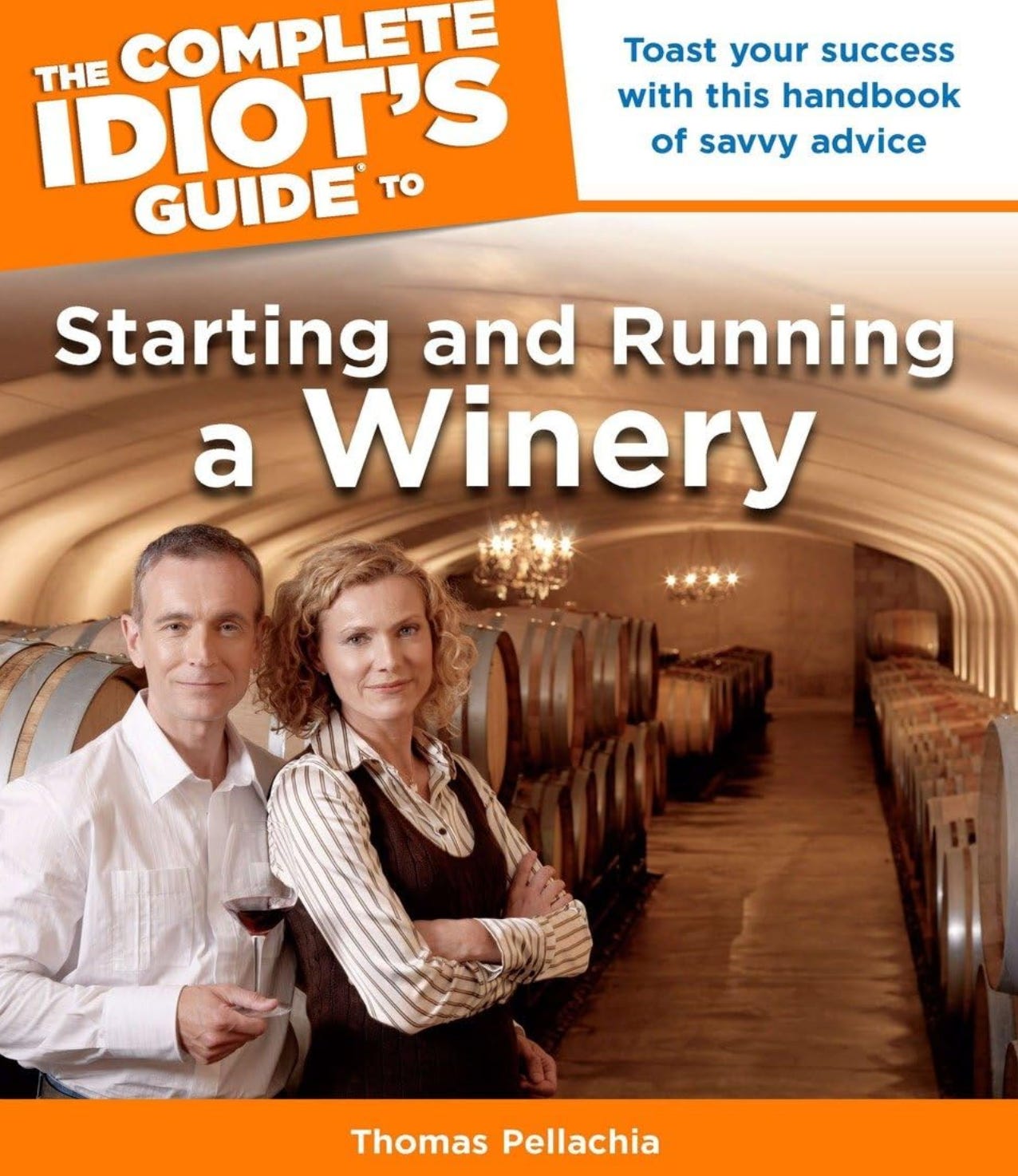
Andrew, it is a comfort to know you have planted your flag and have visions of a good life, but not an easy one. I look forward to future "fermentations" to come. I can barely remember having a long timeline to worry about how it will all come together. We are pretty much in waiting mode in senior retirement 800 miles from everyone and every place that was dear to us less than six months ago. But even so, life has a few higher points from time to time. Be well...